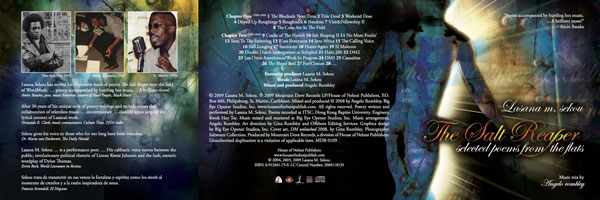 Rediscovering the collaboration of Lasana Sekou and Angelo Rombley
Rediscovering the collaboration of Lasana Sekou and Angelo Rombley
By Tamara Groeneveldt
GRAND CASE, St. Martin (February 14, 2016)—The Salt Reaper – selected poems from the flats by Lasana M. Sekou is a poetry-music CD from which each spoken word track unfolds like a morsel for the listener. As the poet’s voice and the negotiating music by Angelo Rombley travel into each poem or enter the listener, the whole palette of the listener’s senses becomes tantalized.
The Salt Reaper poems vary from stingingly salty and succulently sweet, to scorchingly sour and bitingly bitter. The sounds, riffs, and beats manage to add a fresh dimension to reveal The Salt Reaper’s flesh and inner core.
Each time the spoken word-sound hurls through speakers, air, or headphones there’s a sense of a developing Salt Reaper persona that we can also see, smell, touch, and feel.
St. Martin, Land of Salt, Soualiga, looms large in this recording, competing with personal, regional, and world affairs. I’m more intrigued by how Sekou and Rombley tell and sound off the St. Martin story to the “nation self” and therefore to the world.
Having any idea of the island’s history leaves the listener with questions, even before a whole poem or the whole CD is done playing. Is the purpose of the reaper to procure his saline harvest or to act as the vocal Grim Reaper who retrieves the spirits of a myriad of dead and untold stories (and voices them)? What else to make of the lines in “Salt Reaping II”? “we keep hearing how/it was sweet but hard/ah say, we keep hearing how it was sweet but hard/maybe so/it was like loving.”
In his storytelling and free verse style, Sekou is known for using vocal varieties, intonations, and vernacular, and this audio production brings his poetry alive in ways that we can only imagine when reading his books.
The Salt Reaper poems on disc display vivid images and characters that, on an ordinary day could be found proudly populating the pavements of the ever-expanding palatable paradise of St. Martin with its African, English, French, Dutch, Spanish, Amerindian, and Asian influences.
The Salt Reaper melodically—because I think Sekou sings the words as Rombley spins the beats—takes the listener from the crevices of “New World” inception to the craters of the island’s future, riding waves of musical genres, styles, instruments, and sounds. You’ll find this collaboration at its peak in “Cradle of The Nation,” which reggae scholar and critic Carolyn Cooper has called a “magisterial” poem.
In the track “Freedom,” Sekou personifies Freedom with the raw opening, “Freedom is my bitch to keep.” He is protective and possessive of her like a champion rooster guarding a prized hen—“jealous of her like sickness.” He desirously guards Freedom because he sucked salt and diligently labored to have all of her. His ambition drives him and his desired beloved draws him—“daring me always to be man.”
Freedom, whether individual liberties or political independence, is a constant of Sekou’s poetry, short stories, and essays. His ability to invent and re-invent the duality or multiplicity of that theme keeps him bound to certain traditions of manhood or liberation and yet current, even shockingly new, each time he is read or heard by older or younger generations.
The poem “Freedom” is not all about personal desire. With the music enticing us to do God knows what, the poet also states that Freedom is scorned by “some ah we” but “... you know what?/I want all of our children to look/just like her.”
Rombley’s musical renderings surround each pillar of brackish poetry like stakes, heightening the poetic effectiveness. The music is scoped from contemporary jazz and revengeful rock, to seducing salsa and futuristic metal. Anyone, regardless of origin, could relate to the musical influences, from Caribbean steel pan to Asian chimes.
Sound effects of wind, rain, and trickling water are incorporated in the opening of a few tracks, blending timeless elements of earth with timeless topics such as romance, geography, revolution, hatred, drugs, history, poverty, war, culture, migration, emigration, slavery, religion, colonization, sex, and freedom.
The Salt Reaper seasons the listener with a local and global flavor. Revisiting this CD, seven years since it first appeared is not so much a review but a re-discovery. It is a collection of poetry that is definitely a preservative and a vital stimulant that should be added to your pantry, as this collection is for cooking!
The Salt Reaper is available at Van Dorp, Arnia’s, iTunes, cdbaby.com/cd/lasanamsekou, Amazon.com, and other bookstores. (The Salt Reaper is also available in book form.)











